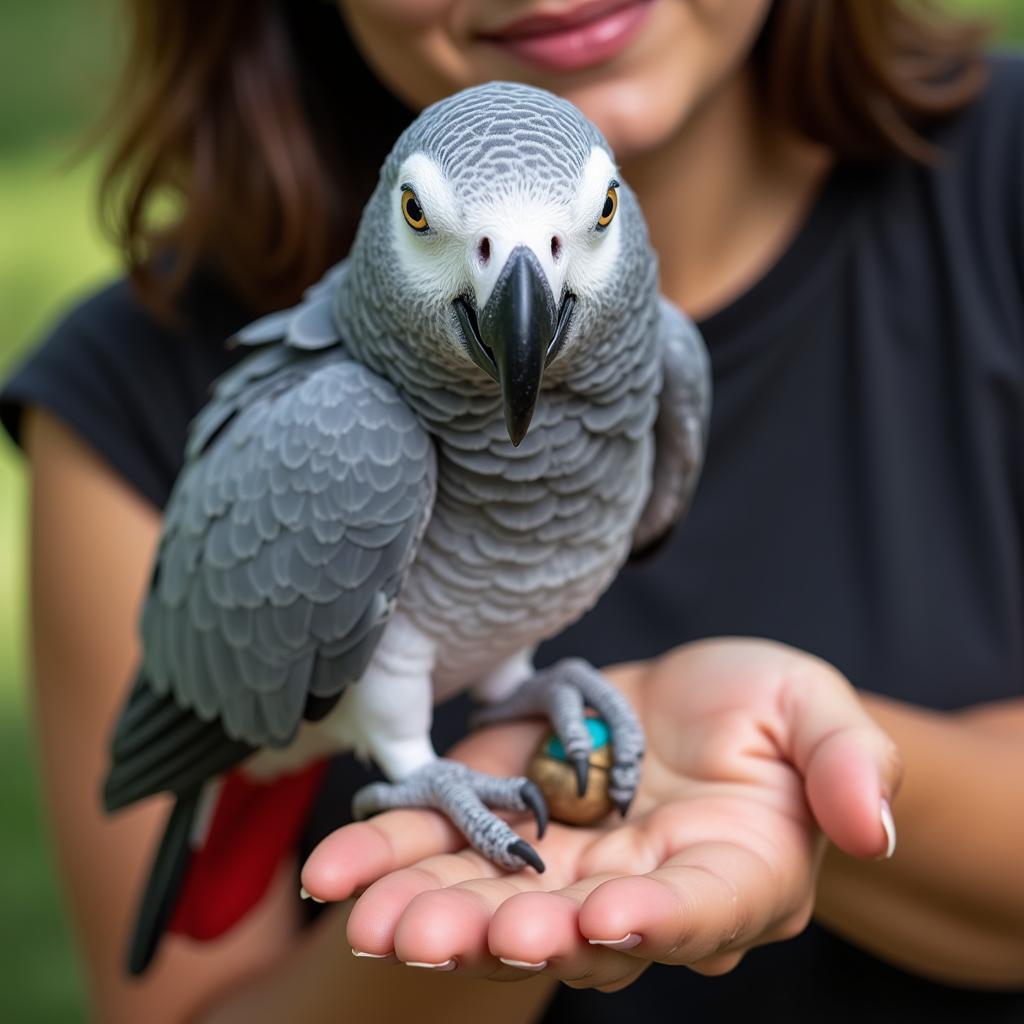African Grey Parrot Food to Avoid: Keeping Your Feathered Friend Safe
African Grey parrots, known for their intelligence and ability to mimic human speech, are beloved companions. As a responsible owner, providing a balanced and safe diet is crucial for their well-being. While an assortment of fruits, vegetables, and formulated pellets should constitute the majority of their meals, it’s equally important to be aware of the foods that can be harmful or even toxic to these sensitive birds. Understanding what your African Grey parrot should avoid is key to ensuring a long, healthy, and vibrant life for your feathered friend.
Foods That Spell Danger for Your African Grey Parrot
Many seemingly harmless foods that humans consume can pose significant health risks to parrots. Let’s delve into the specific foods and ingredients that should never find their way into your African Grey’s food bowl.
1. Avocado: A Toxic Treat
While a staple in many human diets, avocado contains a fungicidal toxin called persin that can be fatal to African Grey parrots. All parts of the avocado plant, including the fruit, pit, leaves, and skin, contain persin and should be strictly avoided.
2. Caffeine: A Silent Threat
Coffee, tea, chocolate, and even some sodas contain caffeine, a stimulant that can be dangerous for African Grey parrots. Even small amounts of caffeine can cause increased heart rate, hyperactivity, tremors, and even seizures in these birds. Ensure their water source is free from any accidental caffeine contamination.
3. Alcohol: No Room for Intoxication
Just as with humans, alcohol is toxic to birds. Even small sips of alcoholic beverages can cause liver damage, coordination problems, and even death in African Grey parrots. Never offer them any food or drink containing alcohol, and be mindful of spills during social gatherings.
4. Chocolate: A Sweet Temptation with Bitter Consequences
Chocolate contains theobromine, a compound similar to caffeine that parrots cannot metabolize effectively. Theobromine poisoning can lead to vomiting, diarrhea, hyperactivity, increased thirst and urination, seizures, and even death. Dark chocolate and baking chocolate contain the highest concentrations of theobromine and pose the greatest risk.
5. Salt and High-Sodium Foods: A Recipe for Imbalance
African Grey parrots have a low tolerance for salt. Excessive salt intake can lead to dehydration, kidney problems, and other health issues. Avoid feeding them salty snacks, processed foods, or table scraps high in sodium.
Understanding the Risks: Why These Foods are Harmful
The digestive systems of African Grey parrots are different from ours. They lack the necessary enzymes to break down certain substances present in the foods listed above. This can lead to a buildup of toxins in their bodies, causing various health problems.
What to Do if Your Parrot Ingests Toxic Food
If you suspect your African Grey parrot has ingested any of the foods listed above, it’s crucial to seek immediate veterinary attention. Time is of the essence in such situations. Contact your avian veterinarian or the nearest animal emergency clinic immediately and describe what your parrot consumed and the symptoms they are exhibiting.
Providing a Safe and Nutritious Diet: The Key to a Healthy Parrot
Knowing what not to feed your African Grey parrot is just as important as knowing what to feed them. A healthy diet for an African Grey parrot consists of:
- High-quality formulated parrot pellets: These should make up 70-80% of their diet.
- Fresh fruits and vegetables: Offer a variety, such as apples, berries, leafy greens, carrots, and bell peppers.
- Cooked legumes and grains: In moderation, cooked beans, lentils, brown rice, and quinoa can be healthy additions.
- Clean, fresh water: Ensure they have access to fresh water at all times.
Creating a Safe Environment for Your Feathered Companion
Beyond a healthy diet, providing a safe and enriching environment is crucial for your African Grey parrot’s well-being. Here are some additional tips:
- Spacious cage: Ensure their cage is large enough to allow for movement and play. Check out this helpful guide on african grey parrot breeding cage size for more information.
- Mental stimulation: Provide toys, puzzles, and opportunities for interaction to keep them mentally stimulated.
- Regular vet check-ups: Schedule routine check-ups with an avian veterinarian to monitor their health and catch any potential issues early on.
By understanding and avoiding these harmful foods and following these care tips, you can ensure a long, healthy, and happy life for your beloved African Grey parrot. Remember, a well-informed owner is a parrot’s best chance at a long and fulfilling life.
Frequently Asked Questions About African Grey Parrot Food
1. Can African Grey parrots eat peanuts?
Yes, African Grey parrots can eat peanuts in moderation. However, it’s important to ensure the peanuts are unsalted, unshelled, and free from any mold.
2. Are seeds bad for African Grey parrots?
While seeds can be a part of their diet, they should not form the majority of it. Seeds are high in fat and low in essential nutrients. A diet primarily consisting of pellets, fruits, and vegetables is much healthier.
3. Can I give my African Grey parrot dairy products?
Parrots are lactose intolerant, so it’s best to avoid giving them milk, cheese, or other dairy products. These can cause digestive upset.
4. How can I tell if my parrot has been poisoned?
Symptoms of poisoning in parrots can include vomiting, diarrhea, lethargy, loss of appetite, seizures, and difficulty breathing. If you notice any of these signs, contact your veterinarian immediately.
5. What are some healthy treats I can give my African Grey parrot?
Small pieces of fruits and vegetables, like berries, apples (without seeds), carrots, and leafy greens, make excellent treats. You can also offer cooked legumes or grains in moderation.
For a deeper understanding of creating a stimulating and enriching environment for your African Grey, consider exploring resources on african grey parrot cage setup.
Need further assistance on parrot care? We are here to help. Contact us at:
Phone Number: +255768904061
Email: kaka.mag@gmail.com
Address: Mbarali DC Mawindi, Kangaga, Tanzania.
Our dedicated customer support team is available 24/7 to address your queries.


